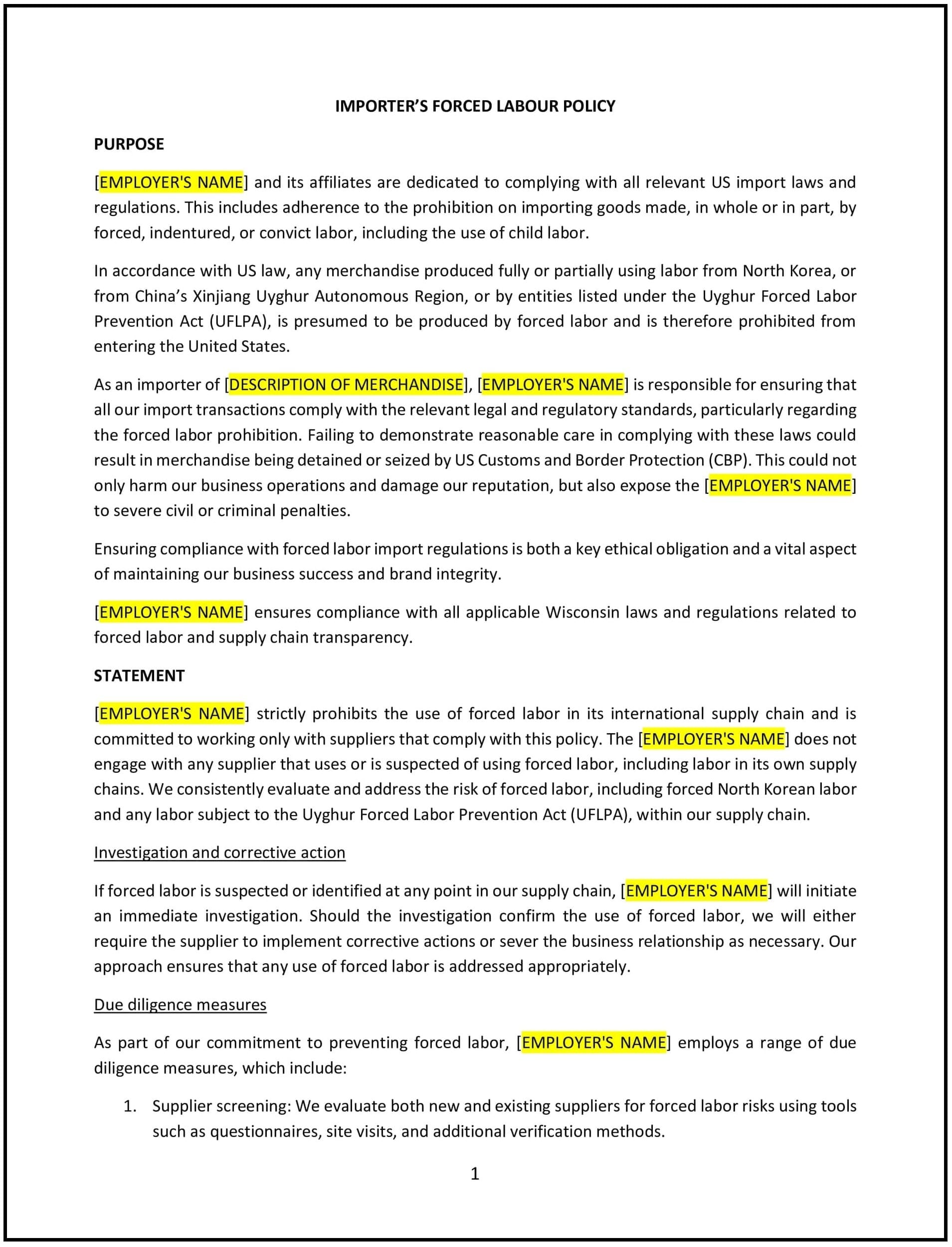Importer's forced labour policy (Wisconsin): Free template
Got contracts to review? While you're here for policies, let Cobrief make contract review effortless—start your free review now.

Customize this template for free
Importer’s forced labour policy (Wisconsin)
An importer’s forced labour policy helps Wisconsin businesses ensure that they are not engaging in or benefiting from the exploitation of forced or child labor in their supply chains. This policy outlines the company’s commitment to ethical sourcing practices, compliance with relevant laws such as the U.S. Tariff Act of 1930, and the steps the company will take to prevent forced labor in its operations and supply chains.
By implementing this policy, businesses can protect human rights, support legal compliance, and promote responsible business practices while building trust with customers, investors, and stakeholders.
How to use this importer's forced labour policy (Wisconsin)
- Define forced labor: Clearly define what constitutes forced labor, including situations where workers are coerced into employment under threat, manipulated or deceived into exploitative work conditions, or subjected to slavery or trafficking practices.
- Establish supply chain responsibilities: Outline the company’s commitment to ensuring that suppliers and vendors comply with ethical labor standards. Specify that the company will not knowingly source goods or services from suppliers that engage in forced labor practices.
- Implement supplier audits: Set up regular audits of suppliers to assess compliance with forced labor standards. Ensure that suppliers understand the company’s expectations regarding forced labor and that they are held accountable for ensuring fair labor practices in their own operations.
- Provide due diligence procedures: Establish a process for identifying and addressing potential risks of forced labor in the company’s supply chain. This may include gathering information about suppliers’ labor practices, conducting risk assessments, and identifying high-risk regions or industries.
- Set corrective action procedures: Specify the actions that the company will take if forced labor is identified in its supply chain, including working with suppliers to address and resolve the issue, terminating relationships with suppliers that do not comply, or reporting violations to authorities.
- Maintain transparency and traceability: Ensure that the company maintains transparency about its supply chain practices and can trace the origin of products to verify that forced labor has not been involved. Publicly disclose the steps taken to mitigate forced labor risks.
- Provide employee training: Offer training for employees and suppliers on identifying and preventing forced labor. Ensure that all employees understand the company’s ethical sourcing standards and know how to report concerns or violations.
- Promote legal compliance: Ensure that the policy complies with all relevant state, federal, and international laws, including the U.S. Tariff Act, the Modern Slavery Act (if applicable), and international human rights conventions that prohibit forced labor.
- Review and update regularly: Periodically review and update the forced labor policy to reflect changes in laws, industry standards, or business operations. Make necessary adjustments based on emerging risks or findings from audits and due diligence processes.
Benefits of using this importer's forced labour policy (Wisconsin)
This policy offers several benefits for Wisconsin businesses:
- Protects human rights: The policy helps protect workers' rights and helps ensure that the company does not contribute to or benefit from exploitative labor practices.
- Reduces legal risks: By ensuring compliance with forced labor regulations, the policy helps businesses avoid legal penalties, fines, and reputational damage that can arise from involvement in forced labor practices.
- Enhances reputation: Businesses that demonstrate a commitment to ethical sourcing and responsible business practices are viewed more favorably by consumers, investors, and stakeholders, which can boost the company’s reputation.
- Improves supply chain transparency: The policy encourages businesses to maintain greater transparency in their supply chains, improving traceability and accountability, which can help identify potential risks and improve supplier relationships.
- Strengthens stakeholder trust: Demonstrating a commitment to eliminating forced labor builds trust with customers, investors, and advocacy groups, who increasingly expect companies to uphold human rights in their supply chains.
- Fosters long-term sustainability: Ensuring ethical labor practices helps create a more sustainable business model by promoting fairness, preventing legal and reputational risks, and aligning with growing consumer and regulatory demands for responsible business practices.
Tips for using this importer's forced labour policy (Wisconsin)
- Communicate the policy clearly: Ensure that all employees and suppliers understand the company’s commitment to preventing forced labor and the procedures for complying with the policy. Make the policy easily accessible to all stakeholders.
- Engage with high-risk suppliers: Work closely with suppliers in high-risk regions or industries to help them understand forced labor risks and provide support for implementing responsible labor practices.
- Conduct regular training: Provide training to employees and suppliers on identifying signs of forced labor and understanding the company’s expectations regarding labor practices.
- Strengthen supplier partnerships: Build strong relationships with suppliers who share the company’s values on ethical sourcing. Consider working with suppliers to improve their labor practices and monitor compliance.
- Audit regularly: Regularly audit suppliers and conduct spot checks to assess compliance with the policy. Use third-party auditors to ensure impartiality and thoroughness.
- Be transparent: Publicly disclose the company’s efforts to eliminate forced labor in its supply chain and the steps taken to ensure ethical sourcing. This helps build credibility and trust with customers, investors, and stakeholders.
- Adjust the policy as needed: Regularly review and update the policy to reflect changes in regulations, business practices, or supplier conditions. Ensure that the policy evolves to address new risks and challenges.